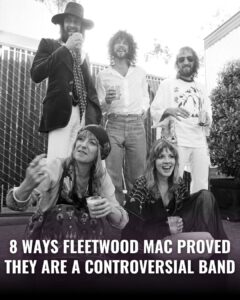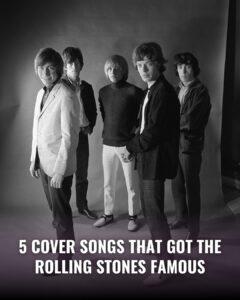10 Biggest Songs Artists Just Gave Away
10 Biggest Songs Artists Just Gave Away

Discovering a tenner in the pocket of a coat you haven’t worn in a long time is a unique experience. Some musicians become so creatively prolific that they have timeless songs hanging around, simply waiting to be shared. As they say, “We’ve got so many, we don’t know where to put them.” Unfortunately, this generosity seems to have slowed down in recent years. These musicians, the generational ones, give out era-defining songs as if they were brimming with them. Coldplay providing Embrace a career boost with Gravity may be the final notable example, but rather than enumerating such instances, let’s concentrate on ten amazing songs that other artists have contributed that will endure.
Mott The Hoople – “All The Young Dudes” (1972)
In one of rock’s most famous acts of generosity, Mott The Hoople was on the brink of breaking up in 1972 due to their lack of success. Enter David Bowie, a fan who stepped in to help. Instead of offering just a hand, Bowie gave them a song. He first suggested “Suffragette City” from The Rise and Fall of Ziggy Stardust, but the band turned it down (which is a bit baffling). Undeterred, Bowie quickly wrote “All the Young Dudes” in just two hours, producing it for the band. The track became a Top Three hit and saved their career. Even more bizarrely, they rejected his follow-up, “Drive-In Saturday.” Some bands really don’t make it easy on themselves!
Badfinger – “Come & Get It” (1969)
Getting a gifted song doesn’t mean that an artist can’t write their own; sometimes, the appropriate person’s song is what gives them the boost they need to advance in their profession. That applied to Martin Scorsese’s favorite band, Badfinger. Despite having songs like “Baby Blue,” “Day After Day,” and “Without You,” a Paul McCartney tune was their big break. Since they were signed to The Beatles’ Apple label, McCartney had a personal stake in their success and assisted them in achieving their first single. Badfinger’s career began with this song, which laid the groundwork for an exciting and frequently tragic journey.
The Bangles – “Manic Monday” (1985)
Among the many songs to come out of Paisley Park, Sinead O’Connor’s iconic version of “Nothing Compares 2 U” stands out. However, since it had already been recorded by Prince’s side project, The Family, it’s technically more of a cover. On the other hand, “Manic Monday” is a true original. Prince initially wrote it for his girl group, Apollonia 6, but later passed it to The Bangles, who eagerly accepted it. Under the pseudonym “Christopher,” Prince gave the song away, but still managed to keep it from hitting Number One in the U.S. charts—thanks to his own “Kiss” occupying that spot.
Stevie Nicks – “Stop Draggin’ My Heart Around” (1981)
“Stop Draggin’ My Heart Around” was more of a heist than a song that was given to Stevie Nicks, though that may be a stretch. Despite her renown as a songwriter, Nicks was hoping Tom Petty would write a song that would give her solo debut the Heartbreakers vibe she adored. The song “Insider” was written by Petty, but he kept it for himself because it was so good. At that point, producer Jimmy Iovine, who collaborated with both Nicks and Petty, took a cunning step. He made a duet out of Nick’s song “Stop Draggin’ My Heart Around.” After initially being irritated, Petty accepted the surprising partnership and even went onstage with Nicks to perform it.
Diana Ross – “Chain Reaction” (1985)
The Bee Gees were prolific songwriters for other people in addition to being hitmakers for themselves. “Heartbreaker” by Dionne Warwick, “Islands in the Stream” by Kenny Rogers and Dolly Parton, and, of course, the well-known Grease theme by Frankie Valli are some of their greatest songs. And sure, Grease is a classic; don’t even consider undervaluing it. However, this song, which was created for one of the genre’s icons, Diana Ross, and combines a Motown beat with an 80s sing-along vibe, might be their greatest success. It became Ross’s second UK Number One after being released in November 1985.
Crosby, Stills, Nash & Young – “Woodstock” (1970)
Her management suggested that a TV appearance would be better for her career, so Joni Mitchell wrote a tribute to the legendary festival she missed, Woodstock, which is featured on her 1970 album Ladies of the Canyon. She was outwitted, nevertheless, by Graham Nash, her then-boyfriend. A more gritty version he recorded with Crosby, Stills, Nash & Young was included on their 1970 album Déjà Vu, which came out one month ahead of Mitchell’s. Jimi Hendrix plays the guitar and bass on this rare 1969 version, which is even more awesome.
Madonna – “Bedtime Story” (1994)
By the time Madonna released her sixth studio album in the mid-90s, she was already a pop icon. After the mixed reception to her 1992 releases—Erotica, Sex, and Body of Evidence—she was eager to reestablish her musical credibility. True to her trailblazing spirit, she turned to the unconventional Björk for help. Though initially hesitant, the Icelandic artist crafted “Let’s Get Unconscious” (later retitled Bedtime Story) with producer Nellee Hooper. The track became the centerpiece of Madonna’s Bedtime Stories album, signaling her shift towards electronic-pop and paving the way for the brilliant Ray of Light that would follow.
Tina Turner – “Private Dancer” (1984)
The title track from Tina Turner’s groundbreaking fifth solo album takes on new meaning when you learn it was written by Mark Knopfler of Dire Straits. In Turner’s hands, the song becomes a soulful, weary ballad, giving its massive hook emotional depth. Although there’s a Dire Straits recording of it hidden away, it’s safe to say no one needs to hear Knopfler—who’s always looked like he was born middle-aged—singing “I’m your private dancer, a dancer for money, and any old music will do.” He clearly agreed, ditching his band’s version and offering it to Turner two years later, though not before reworking the melody for Love Over Gold (which, frankly, didn’t hit the mark).
James Taylor – “You’ve Got A Friend” (1971)
To put it bluntly, Carole King was one of the most giving friends of American singer-songwriter James Taylor. King was influenced by Taylor’s heartfelt ballad “Fire and Rain” while they were both working on their albums, exchanging ideas and musicians in the studio. King responded with one of the greatest songs ever, “You’ve Got a Friend.” It’s one of those songs that never seems to go out of style as if it’s always been there. King’s Tapestry and Taylor’s Mud Slide Slim and the Blue Horizon, which were released only a few months apart, both featured it on their albums. Taylor’s rendition turned into a smash song.
Patti Smith Group – “Because The Night” (1978)
Jimmy Iovine, the producer, made another smart move by working with both Bruce Springsteen and Patti Smith simultaneously. Iovine had an idea as he watched Springsteen try to get “Because The Night” right. He recommended giving Smith the anthem and expressed to Springsteen how much he wanted her to have a hit. Smith made some changes to the lyrics after Springsteen gave his approval. The song became a huge hit and contributed to the success of her third album, Easter.












